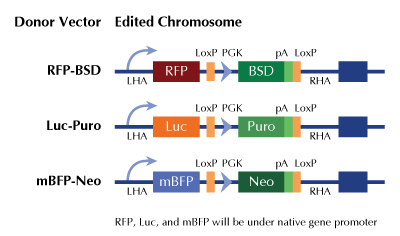CD4 Human Gene Knockout Kit (CRISPR)
CAT#: KN206453LP
CD4 - human gene knockout kit via CRISPR, HDR mediated
HDR-mediated knockout kit validation
CNY 12,260.00
CNY 3,710.00
CNY 1,999.00
CNY 2,700.00
CNY 3,656.00
CNY 3,990.00
Specifications
| Product Data | |
| Format | 2 gRNA vectors, 1 Luciferase-Puro donor, 1 scramble control |
| Donor DNA | Luciferase-Puro |
| Symbol | CD4 |
| Locus ID | 920 |
| Kit Components |
KN206453G1, CD4 gRNA vector 1 in pCas-Guide CRISPR vector KN206453G2, CD4 gRNA vector 2 in pCas-Guide CRISPR vector KN206453LP-D, donor DNA containing left and right homologous arms and Luciferase-Puro functional cassette. GE100003, scramble sequence in pCas-Guide vector |
| Disclaimer | These products are manufactured and supplied by OriGene under license from ERS. The kit is designed based on the best knowledge of CRISPR technology. The system has been functionally validated for knocking-in the cassette downstream the native promoter. The efficiency of the knock-out varies due to the nature of the biology and the complexity of the experimental process. |
| Reference Data | |
| RefSeq | NM_000616, NM_001195014, NM_001195015, NM_001195016, NM_001195017, NR_036545 |
| Synonyms | CD4mut |
| Summary | This gene encodes the CD4 membrane glycoprotein of T lymphocytes. The CD4 antigen acts as a coreceptor with the T-cell receptor on the T lymphocyte to recognize antigens displayed by an antigen presenting cell in the context of class II MHC molecules. The CD4 antigen is also a primary receptor for entry of the human immunodeficiency virus through interactions with the HIV Env gp120 subunit. This gene is expressed not only in T lymphocytes, but also in B cells, macrophages, granulocytes, as well as in various regions of the brain. The protein functions to initiate or augment the early phase of T-cell activation, and may function as an important mediator of indirect neuronal damage in infectious and immune-mediated diseases of the central nervous system. Multiple alternatively spliced transcript variants encoding different isoforms have been identified in this gene. [provided by RefSeq, May 2020] |
Documents
| Product Manuals |
| FAQs |
Resources
| 基因表达相关资源 |
Other Versions
| SKU | Description | Size | Price |
|---|---|---|---|
| KN206453 | CD4 - human gene knockout kit via CRISPR, HDR mediated |
CNY 12,260.00 |
|
| KN206453BN | CD4 - human gene knockout kit via CRISPR, HDR mediated |
CNY 12,260.00 |
|
| KN206453RB | CD4 - human gene knockout kit via CRISPR, HDR mediated |
CNY 12,260.00 |
|
| KN406453 | CD4 - KN2.0, Human gene knockout kit via CRISPR, non-homology mediated. |
CNY 8,680.00 |
|
| GA100647 | CD4 CRISPRa kit - CRISPR gene activation of human CD4 molecule |
CNY 12,255.00 |


 United States
United States
 Germany
Germany
 Japan
Japan
 United Kingdom
United Kingdom
 China
China

